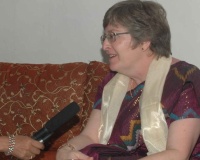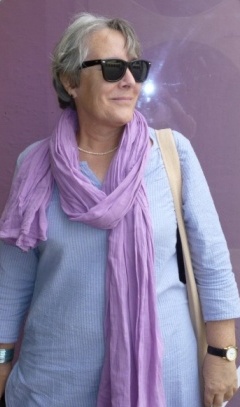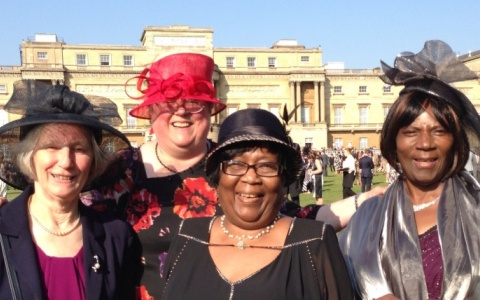Women at work: British achievers confound the theologians
by - 1st August 2013
 WOMEN who undertake arduous secular service on a wing and a prayer – literally – and who are winning awards around the world, are outrunning the ability of theologians to explain their spirituality.
WOMEN who undertake arduous secular service on a wing and a prayer – literally – and who are winning awards around the world, are outrunning the ability of theologians to explain their spirituality.
Unrecognized, but motivated by their faith, ordinary women are making an extraordinary difference away from the limelight, or cultural support systems.
While new research indicates that theology ‘has failed to appreciate the contribution made by working women’, many are getting on with it sustained by do-it-yourself spiritualities.
Helen Stawski, who has surveyed 15 professionals for an MA dissertation at Heythrop College on the spirituality of working women, says:
‘The spiritual resilience and productivity of Christian women is far outstripping the capacity of (male) theologians to reckon with it’.
She adds: 'There’s not been nearly enough theology of work, and women are doubly effected by that because of the historical baggage.'
Award
Norfolk-born former GP Rachel Karrach picked up Nepal’s Best Hospital Award run by the monthly health magazine Swasthiya Kabar Patrika, a year ago.
Unmarried, and serving a Nepali staff of 380 at Tansen Mission Hospital, Karrach left for Nepal in 1994, turning her back on security, status, and salary for a life in the Himalayas, where she has to function at full stretch in a foreign language.
Twenty years ago the incubator was a crate with a lightbulb dangling over it. Today this 165-bed hospital has been recognized at a televised award ceremony by the Minister of Health and Population, Bidhyadhar Mallik.
 Tansen is the district headquarters and commercial centre of Palpa District, in the middle hills of Nepal, at an altitude of 1400 metres, 300 kms west of Kathmandu. It is just 80kms from the Indian border. Such is the quality of care that 70% of its patients come from the surrounding nine districts of Western Nepal, including parts of North India.
Tansen is the district headquarters and commercial centre of Palpa District, in the middle hills of Nepal, at an altitude of 1400 metres, 300 kms west of Kathmandu. It is just 80kms from the Indian border. Such is the quality of care that 70% of its patients come from the surrounding nine districts of Western Nepal, including parts of North India.
It handles 80,000 outpatients per year, 12,000 inpatient visits, and has extensive training and community rehabilitation functions.
As with everywhere else in the world, Christians pioneered hospitals and healthcare in Nepal, in this case the United Mission to Nepal, nearly sixty years ago. Tansen’s motto is ‘We serve, Jesus heals’.
Said Karrach in her self-effacing acceptance speech: ‘We want the glory to go to God for our success, and also give thanks to all the hospital staff, whose faithful service has enabled this hospital to be the best hospital in Nepal.’

UMN Board Member Heather Payne, a Brit who was born in Orissa, India, picked up another award for Tansen Hospital at an event in Delhi in November last year – a ‘Healthcare Leadership Award’ in the hospital category.
Delhi-based Payne is herself a self-sustaining social development consultant, who recently wrote the successful bid for nearly E1million of EU funding for disability project in five of the poorest districts in India.
She said: ‘People with disabilities are always disproportionately represented in any country’s population living below the poverty line, which, in India, is very low indeed. This funding is strategic and hopeful.’
The work to be run by a consortium of five NGOs under the German Leprosy Relief Association will help poor people and their families access government schemes and services. An estimated 1.4million will benefit.
She is also pioneering a breathtakingly ambitious corporate social responsibility bid with controversial developer Sahara, the business house who are attempting to build an ecologically cutting-edge ‘super-critical’ thermal power plant in Balangir District in Orissa. Both projects are being run in conjunction with local church-based NGO, ASHA, meaning hope in Hindi.
Payne, supported by friends and a wealthy Anglican church in Muswell Hill, London, sold her home to fund an MA in women's development at Reading.
She puts her drive down to ‘conviction’. ‘The Lord has given me a great sense of purpose and privilege in working here. I love the work and the fact that I can contribute to the lives of those people who have huge needs, and don’t have many other people fighting for them.’
Overstayers

In June, mother-of-three Ursula Standen and her team picked up a Queen’s Award for Voluntary Service in Redbridge in East London.
The award was given to 117 individuals and groups to mark the 60th Anniversary of the Queen's Coronation.
Project Coordinator of the Redbridge Welcome Centre, Ursula manages 30 volunteers at the stunning new £2million building with between 35 and 50 clients a day. These range from ‘overstayers’ released from detention centres with nowhere to go, to asylum seekers and alcoholics.
The Welcome Centre is part of Healthy Living Projects (HLP) which is a registered charity established in November 2000 to oversee a range of social action initiatives in the local community.
HLP works with three main groups; socially isolated and vulnerable adults, children and families and the elderly. Its aims are to improve health and well-being, reduce poverty, improve education and overcome social isolation.
It offers drug and alcohol recovery programmes, life skills training, ‘back to work’ and English classes.
The project is mostly funded by the churches and international evangelical charity Tear Fund, and only the capital came from money allocated by the Labour Government to eradicate homelessness.
Redbridge Borough Council Housing Strategy Officer Peter Bradbeer describes Standen’s work as ‘absolutely invaluable’, and without it there would be no provision for rough sleepers in the borough in the winter.
‘The excellent projects for rough sleepers in Redbridge grew out of the commitment of local churches to meeting the needs of these vulnerable people.
'For most single homeless people there is not a statutory legal duty to be accommodated and therefore the importance of the work of Ursula Standen and the local churches cannot be overestimated.’
Government and GLA guidance required local authorities merely to work with the voluntary sector to put in place plans to prevent deaths during severe freezing weather, he said.
He added: 'Redbridge Council fully supports the vital work of local churches in running the winter night shelters. Ursula ensured that the most vulnerable gain a place at the winter shelters'.
This was the Big Society at work, he said. Its value was 'fully recognised' by the Council and the Queen’s Award was 'very well merited.'
Professional
Secular politicians who take the motivation of these women and the results they help generate for granted could get a more robust reminder from the church, it seems.
Dr Mark Greene, pioneer of workplace ministry at the London Institute of Contemporary Christianity in London, and author of Thank God it’s Monday and Christian Life and Work said: ‘If anything the church is much more likely to celebrate women doing great things overseas than women doing great things in Clapham.’
Helen Stawski said: ‘We need more of an integrated sense of the sacred being everywhere.
‘People who live in relational ways in community, immersing themselves in the slums or in the office or wherever, for whom that is their daily bread and wine – they will win awards.’
- Log in to post comments
